Context of Business: Leadership, Ethics, and Sustainable Practices
VerifiedAdded on 2020/12/09
|6
|1497
|449
Essay
AI Summary
This essay delves into the crucial importance of responsible, sustainable, and ethical management within the context of business. It explores how organizations and individuals should navigate cultural, social, economic, and environmental issues to remain competitive and contribute positively to society. The essay emphasizes the need for businesses to address societal problems and invest in environmental sustainability. It highlights the impact of leadership in fostering ethical practices and adapting to the dynamic business environment. Furthermore, the essay discusses the significance of ethical behavior in building customer trust and the role of leadership in successful diversification and innovation to meet evolving customer needs and preferences. It concludes by stressing the importance of continuous adaptation, competitor analysis, and flexible business strategies for long-term competitiveness.
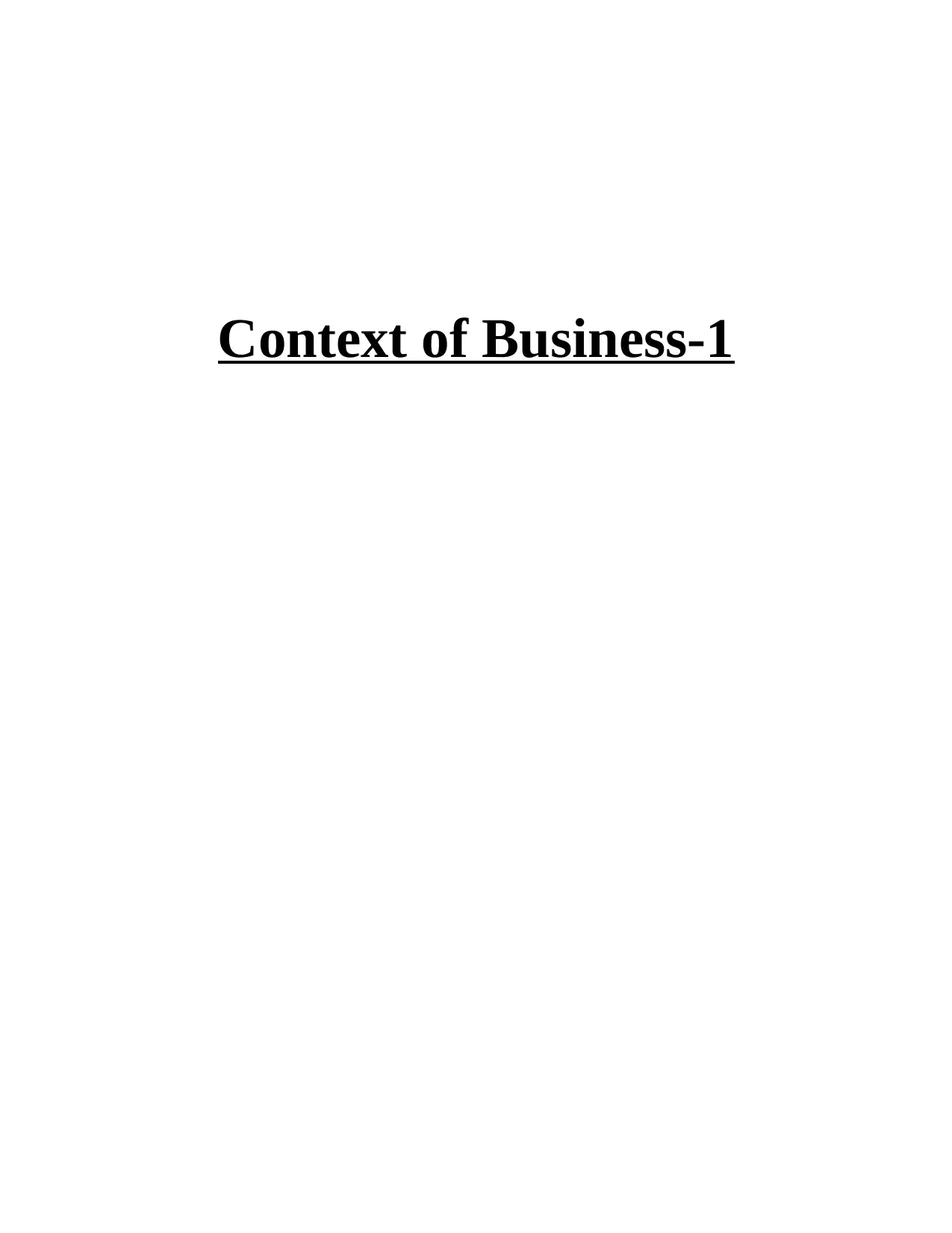
Context of Business-1
Paraphrase This Document
Need a fresh take? Get an instant paraphrase of this document with our AI Paraphraser
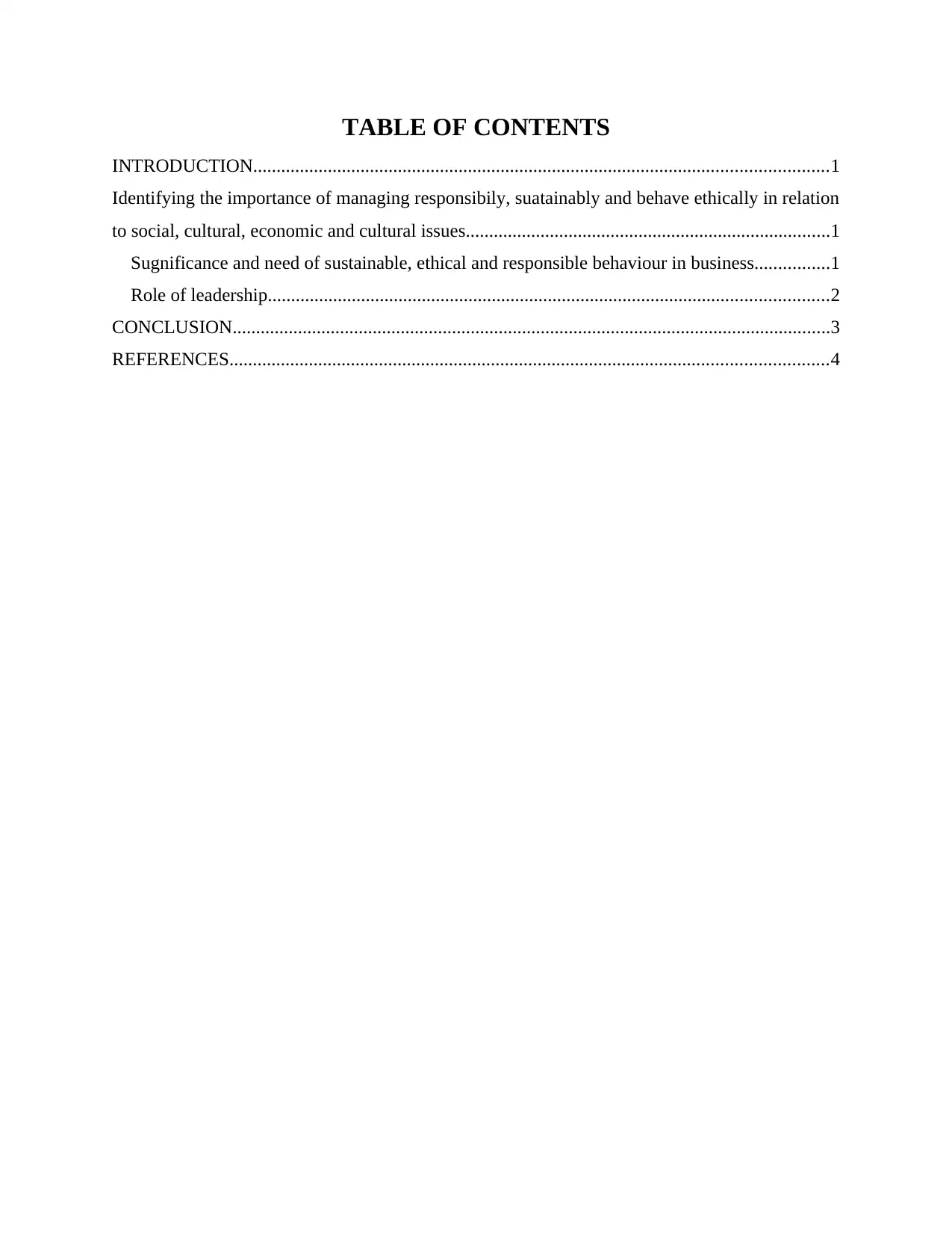
TABLE OF CONTENTS
INTRODUCTION...........................................................................................................................1
Identifying the importance of managing responsibily, suatainably and behave ethically in relation
to social, cultural, economic and cultural issues..............................................................................1
Sugnificance and need of sustainable, ethical and responsible behaviour in business................1
Role of leadership........................................................................................................................2
CONCLUSION................................................................................................................................3
REFERENCES................................................................................................................................4
INTRODUCTION...........................................................................................................................1
Identifying the importance of managing responsibily, suatainably and behave ethically in relation
to social, cultural, economic and cultural issues..............................................................................1
Sugnificance and need of sustainable, ethical and responsible behaviour in business................1
Role of leadership........................................................................................................................2
CONCLUSION................................................................................................................................3
REFERENCES................................................................................................................................4
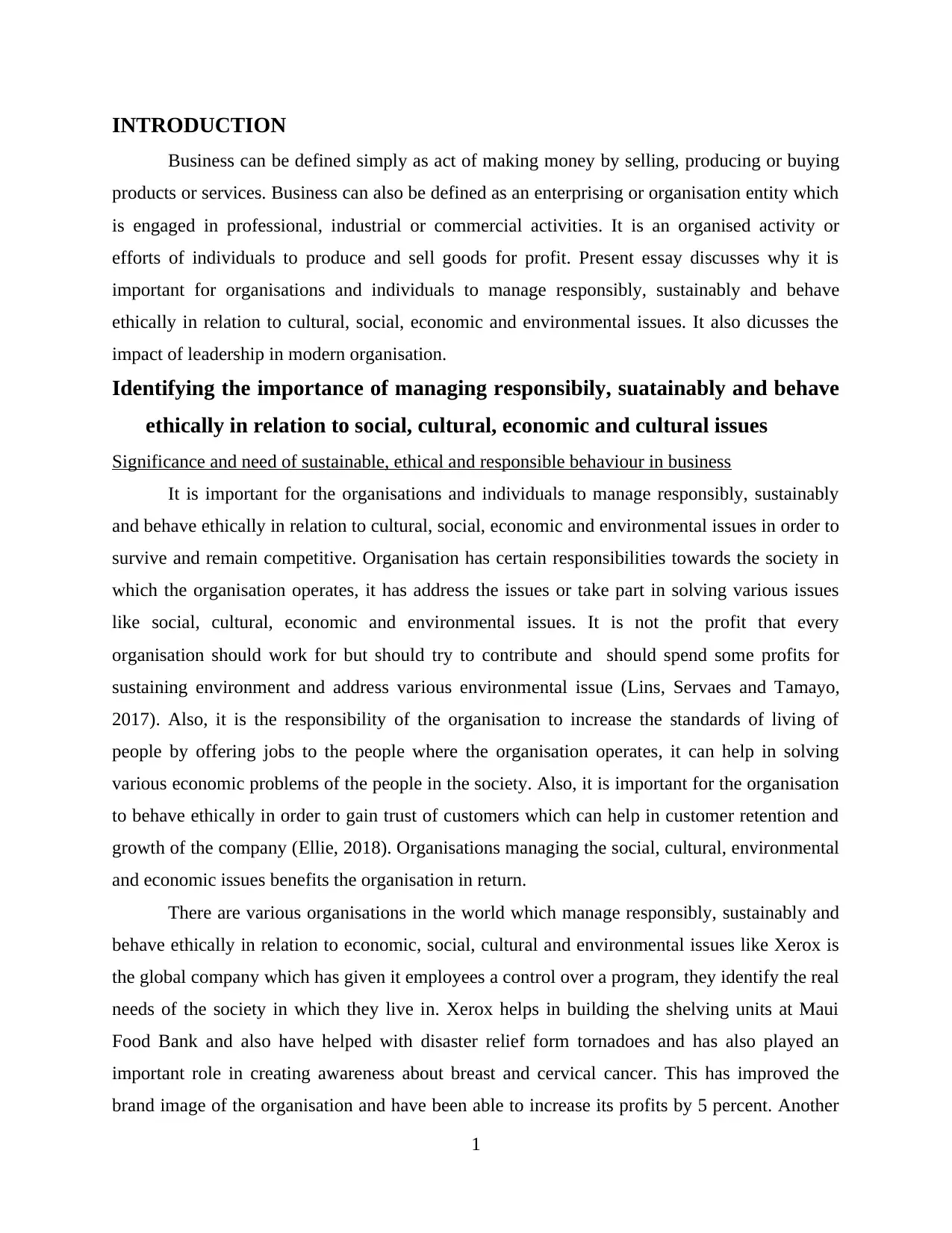
INTRODUCTION
Business can be defined simply as act of making money by selling, producing or buying
products or services. Business can also be defined as an enterprising or organisation entity which
is engaged in professional, industrial or commercial activities. It is an organised activity or
efforts of individuals to produce and sell goods for profit. Present essay discusses why it is
important for organisations and individuals to manage responsibly, sustainably and behave
ethically in relation to cultural, social, economic and environmental issues. It also dicusses the
impact of leadership in modern organisation.
Identifying the importance of managing responsibily, suatainably and behave
ethically in relation to social, cultural, economic and cultural issues
Significance and need of sustainable, ethical and responsible behaviour in business
It is important for the organisations and individuals to manage responsibly, sustainably
and behave ethically in relation to cultural, social, economic and environmental issues in order to
survive and remain competitive. Organisation has certain responsibilities towards the society in
which the organisation operates, it has address the issues or take part in solving various issues
like social, cultural, economic and environmental issues. It is not the profit that every
organisation should work for but should try to contribute and should spend some profits for
sustaining environment and address various environmental issue (Lins, Servaes and Tamayo,
2017). Also, it is the responsibility of the organisation to increase the standards of living of
people by offering jobs to the people where the organisation operates, it can help in solving
various economic problems of the people in the society. Also, it is important for the organisation
to behave ethically in order to gain trust of customers which can help in customer retention and
growth of the company (Ellie, 2018). Organisations managing the social, cultural, environmental
and economic issues benefits the organisation in return.
There are various organisations in the world which manage responsibly, sustainably and
behave ethically in relation to economic, social, cultural and environmental issues like Xerox is
the global company which has given it employees a control over a program, they identify the real
needs of the society in which they live in. Xerox helps in building the shelving units at Maui
Food Bank and also have helped with disaster relief form tornadoes and has also played an
important role in creating awareness about breast and cervical cancer. This has improved the
brand image of the organisation and have been able to increase its profits by 5 percent. Another
1
Business can be defined simply as act of making money by selling, producing or buying
products or services. Business can also be defined as an enterprising or organisation entity which
is engaged in professional, industrial or commercial activities. It is an organised activity or
efforts of individuals to produce and sell goods for profit. Present essay discusses why it is
important for organisations and individuals to manage responsibly, sustainably and behave
ethically in relation to cultural, social, economic and environmental issues. It also dicusses the
impact of leadership in modern organisation.
Identifying the importance of managing responsibily, suatainably and behave
ethically in relation to social, cultural, economic and cultural issues
Significance and need of sustainable, ethical and responsible behaviour in business
It is important for the organisations and individuals to manage responsibly, sustainably
and behave ethically in relation to cultural, social, economic and environmental issues in order to
survive and remain competitive. Organisation has certain responsibilities towards the society in
which the organisation operates, it has address the issues or take part in solving various issues
like social, cultural, economic and environmental issues. It is not the profit that every
organisation should work for but should try to contribute and should spend some profits for
sustaining environment and address various environmental issue (Lins, Servaes and Tamayo,
2017). Also, it is the responsibility of the organisation to increase the standards of living of
people by offering jobs to the people where the organisation operates, it can help in solving
various economic problems of the people in the society. Also, it is important for the organisation
to behave ethically in order to gain trust of customers which can help in customer retention and
growth of the company (Ellie, 2018). Organisations managing the social, cultural, environmental
and economic issues benefits the organisation in return.
There are various organisations in the world which manage responsibly, sustainably and
behave ethically in relation to economic, social, cultural and environmental issues like Xerox is
the global company which has given it employees a control over a program, they identify the real
needs of the society in which they live in. Xerox helps in building the shelving units at Maui
Food Bank and also have helped with disaster relief form tornadoes and has also played an
important role in creating awareness about breast and cervical cancer. This has improved the
brand image of the organisation and have been able to increase its profits by 5 percent. Another
1
⊘ This is a preview!⊘
Do you want full access?
Subscribe today to unlock all pages.

Trusted by 1+ million students worldwide
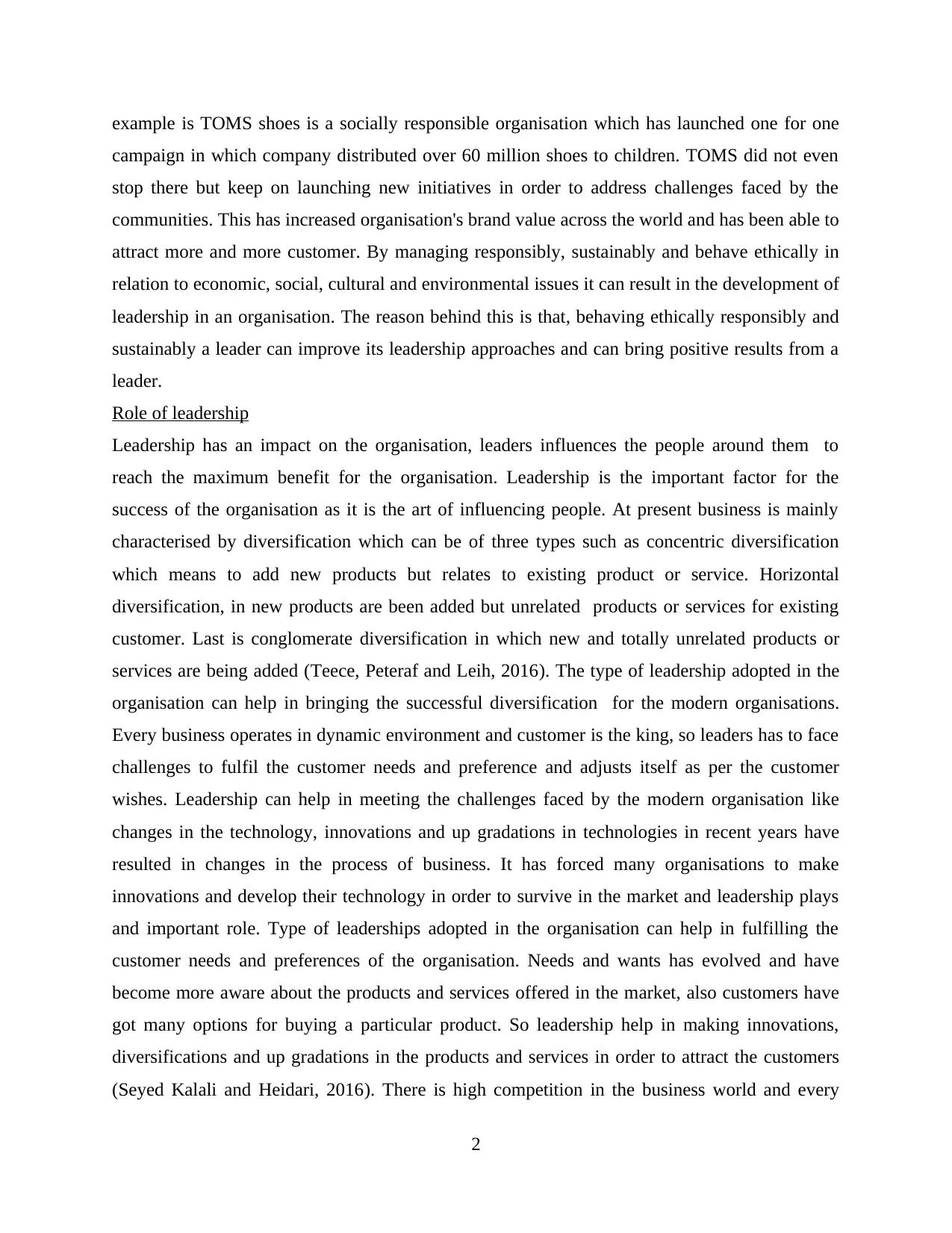
example is TOMS shoes is a socially responsible organisation which has launched one for one
campaign in which company distributed over 60 million shoes to children. TOMS did not even
stop there but keep on launching new initiatives in order to address challenges faced by the
communities. This has increased organisation's brand value across the world and has been able to
attract more and more customer. By managing responsibly, sustainably and behave ethically in
relation to economic, social, cultural and environmental issues it can result in the development of
leadership in an organisation. The reason behind this is that, behaving ethically responsibly and
sustainably a leader can improve its leadership approaches and can bring positive results from a
leader.
Role of leadership
Leadership has an impact on the organisation, leaders influences the people around them to
reach the maximum benefit for the organisation. Leadership is the important factor for the
success of the organisation as it is the art of influencing people. At present business is mainly
characterised by diversification which can be of three types such as concentric diversification
which means to add new products but relates to existing product or service. Horizontal
diversification, in new products are been added but unrelated products or services for existing
customer. Last is conglomerate diversification in which new and totally unrelated products or
services are being added (Teece, Peteraf and Leih, 2016). The type of leadership adopted in the
organisation can help in bringing the successful diversification for the modern organisations.
Every business operates in dynamic environment and customer is the king, so leaders has to face
challenges to fulfil the customer needs and preference and adjusts itself as per the customer
wishes. Leadership can help in meeting the challenges faced by the modern organisation like
changes in the technology, innovations and up gradations in technologies in recent years have
resulted in changes in the process of business. It has forced many organisations to make
innovations and develop their technology in order to survive in the market and leadership plays
and important role. Type of leaderships adopted in the organisation can help in fulfilling the
customer needs and preferences of the organisation. Needs and wants has evolved and have
become more aware about the products and services offered in the market, also customers have
got many options for buying a particular product. So leadership help in making innovations,
diversifications and up gradations in the products and services in order to attract the customers
(Seyed Kalali and Heidari, 2016). There is high competition in the business world and every
2
campaign in which company distributed over 60 million shoes to children. TOMS did not even
stop there but keep on launching new initiatives in order to address challenges faced by the
communities. This has increased organisation's brand value across the world and has been able to
attract more and more customer. By managing responsibly, sustainably and behave ethically in
relation to economic, social, cultural and environmental issues it can result in the development of
leadership in an organisation. The reason behind this is that, behaving ethically responsibly and
sustainably a leader can improve its leadership approaches and can bring positive results from a
leader.
Role of leadership
Leadership has an impact on the organisation, leaders influences the people around them to
reach the maximum benefit for the organisation. Leadership is the important factor for the
success of the organisation as it is the art of influencing people. At present business is mainly
characterised by diversification which can be of three types such as concentric diversification
which means to add new products but relates to existing product or service. Horizontal
diversification, in new products are been added but unrelated products or services for existing
customer. Last is conglomerate diversification in which new and totally unrelated products or
services are being added (Teece, Peteraf and Leih, 2016). The type of leadership adopted in the
organisation can help in bringing the successful diversification for the modern organisations.
Every business operates in dynamic environment and customer is the king, so leaders has to face
challenges to fulfil the customer needs and preference and adjusts itself as per the customer
wishes. Leadership can help in meeting the challenges faced by the modern organisation like
changes in the technology, innovations and up gradations in technologies in recent years have
resulted in changes in the process of business. It has forced many organisations to make
innovations and develop their technology in order to survive in the market and leadership plays
and important role. Type of leaderships adopted in the organisation can help in fulfilling the
customer needs and preferences of the organisation. Needs and wants has evolved and have
become more aware about the products and services offered in the market, also customers have
got many options for buying a particular product. So leadership help in making innovations,
diversifications and up gradations in the products and services in order to attract the customers
(Seyed Kalali and Heidari, 2016). There is high competition in the business world and every
2
Paraphrase This Document
Need a fresh take? Get an instant paraphrase of this document with our AI Paraphraser
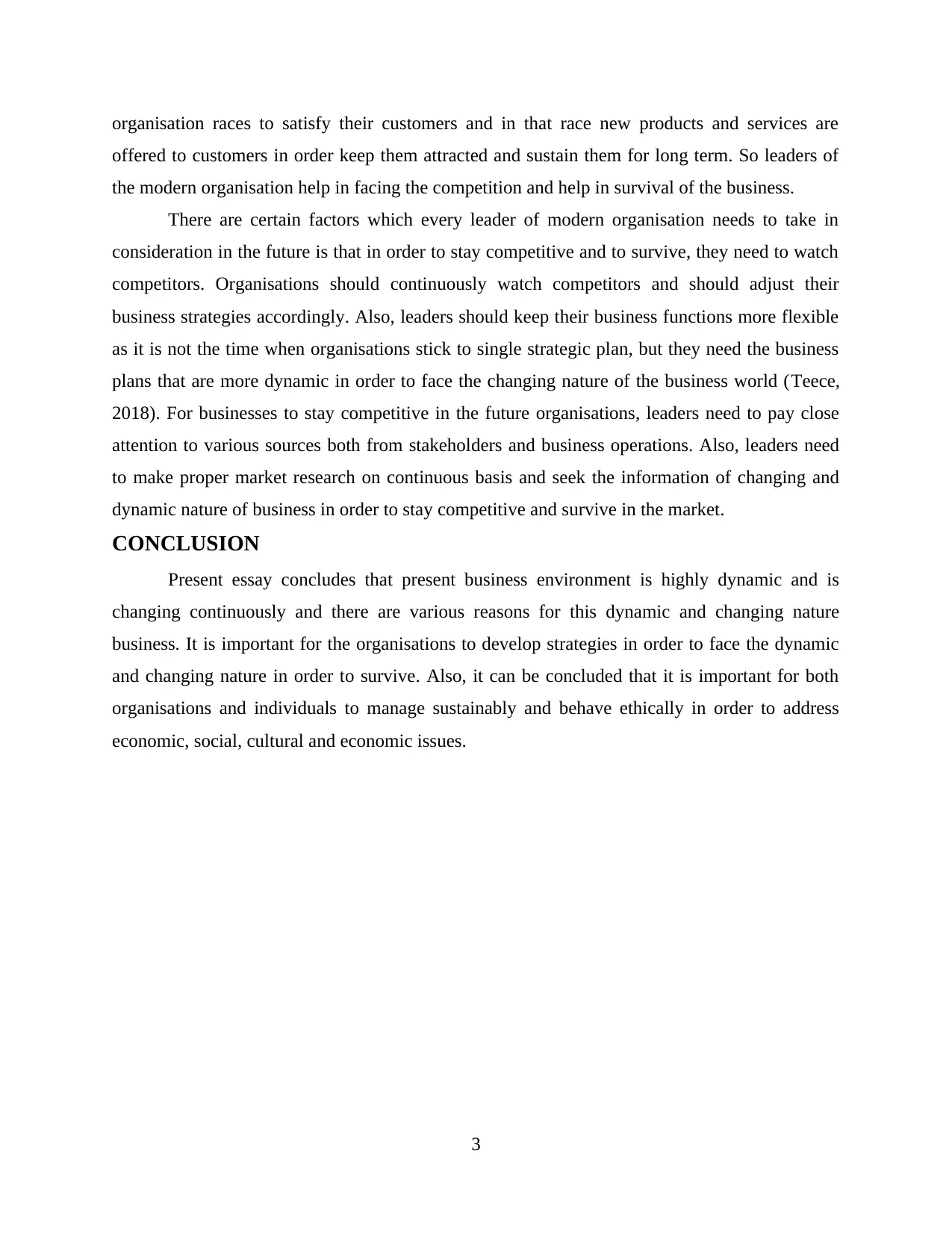
organisation races to satisfy their customers and in that race new products and services are
offered to customers in order keep them attracted and sustain them for long term. So leaders of
the modern organisation help in facing the competition and help in survival of the business.
There are certain factors which every leader of modern organisation needs to take in
consideration in the future is that in order to stay competitive and to survive, they need to watch
competitors. Organisations should continuously watch competitors and should adjust their
business strategies accordingly. Also, leaders should keep their business functions more flexible
as it is not the time when organisations stick to single strategic plan, but they need the business
plans that are more dynamic in order to face the changing nature of the business world (Teece,
2018). For businesses to stay competitive in the future organisations, leaders need to pay close
attention to various sources both from stakeholders and business operations. Also, leaders need
to make proper market research on continuous basis and seek the information of changing and
dynamic nature of business in order to stay competitive and survive in the market.
CONCLUSION
Present essay concludes that present business environment is highly dynamic and is
changing continuously and there are various reasons for this dynamic and changing nature
business. It is important for the organisations to develop strategies in order to face the dynamic
and changing nature in order to survive. Also, it can be concluded that it is important for both
organisations and individuals to manage sustainably and behave ethically in order to address
economic, social, cultural and economic issues.
3
offered to customers in order keep them attracted and sustain them for long term. So leaders of
the modern organisation help in facing the competition and help in survival of the business.
There are certain factors which every leader of modern organisation needs to take in
consideration in the future is that in order to stay competitive and to survive, they need to watch
competitors. Organisations should continuously watch competitors and should adjust their
business strategies accordingly. Also, leaders should keep their business functions more flexible
as it is not the time when organisations stick to single strategic plan, but they need the business
plans that are more dynamic in order to face the changing nature of the business world (Teece,
2018). For businesses to stay competitive in the future organisations, leaders need to pay close
attention to various sources both from stakeholders and business operations. Also, leaders need
to make proper market research on continuous basis and seek the information of changing and
dynamic nature of business in order to stay competitive and survive in the market.
CONCLUSION
Present essay concludes that present business environment is highly dynamic and is
changing continuously and there are various reasons for this dynamic and changing nature
business. It is important for the organisations to develop strategies in order to face the dynamic
and changing nature in order to survive. Also, it can be concluded that it is important for both
organisations and individuals to manage sustainably and behave ethically in order to address
economic, social, cultural and economic issues.
3
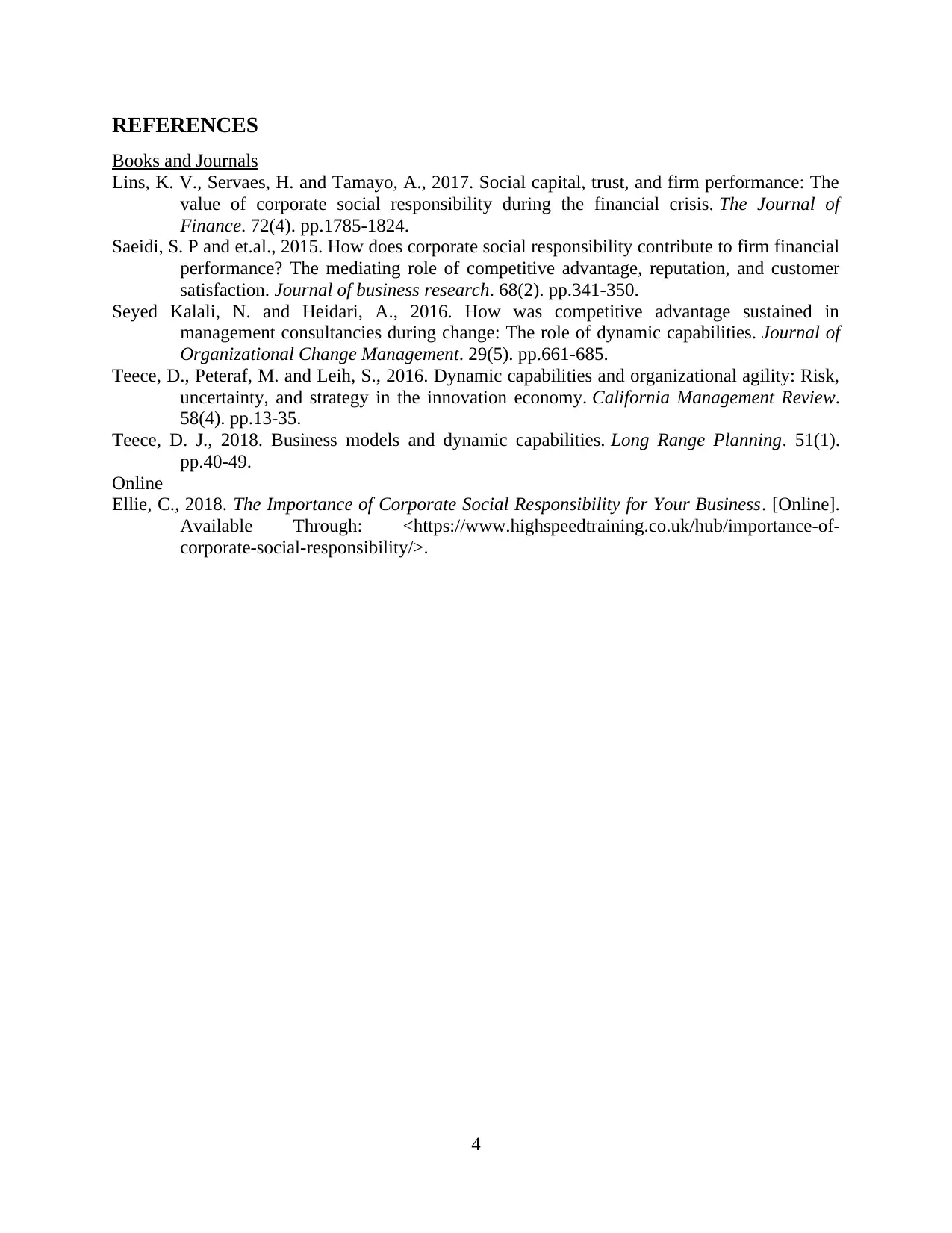
REFERENCES
Books and Journals
Lins, K. V., Servaes, H. and Tamayo, A., 2017. Social capital, trust, and firm performance: The
value of corporate social responsibility during the financial crisis. The Journal of
Finance. 72(4). pp.1785-1824.
Saeidi, S. P and et.al., 2015. How does corporate social responsibility contribute to firm financial
performance? The mediating role of competitive advantage, reputation, and customer
satisfaction. Journal of business research. 68(2). pp.341-350.
Seyed Kalali, N. and Heidari, A., 2016. How was competitive advantage sustained in
management consultancies during change: The role of dynamic capabilities. Journal of
Organizational Change Management. 29(5). pp.661-685.
Teece, D., Peteraf, M. and Leih, S., 2016. Dynamic capabilities and organizational agility: Risk,
uncertainty, and strategy in the innovation economy. California Management Review.
58(4). pp.13-35.
Teece, D. J., 2018. Business models and dynamic capabilities. Long Range Planning. 51(1).
pp.40-49.
Online
Ellie, C., 2018. The Importance of Corporate Social Responsibility for Your Business. [Online].
Available Through: <https://www.highspeedtraining.co.uk/hub/importance-of-
corporate-social-responsibility/>.
4
Books and Journals
Lins, K. V., Servaes, H. and Tamayo, A., 2017. Social capital, trust, and firm performance: The
value of corporate social responsibility during the financial crisis. The Journal of
Finance. 72(4). pp.1785-1824.
Saeidi, S. P and et.al., 2015. How does corporate social responsibility contribute to firm financial
performance? The mediating role of competitive advantage, reputation, and customer
satisfaction. Journal of business research. 68(2). pp.341-350.
Seyed Kalali, N. and Heidari, A., 2016. How was competitive advantage sustained in
management consultancies during change: The role of dynamic capabilities. Journal of
Organizational Change Management. 29(5). pp.661-685.
Teece, D., Peteraf, M. and Leih, S., 2016. Dynamic capabilities and organizational agility: Risk,
uncertainty, and strategy in the innovation economy. California Management Review.
58(4). pp.13-35.
Teece, D. J., 2018. Business models and dynamic capabilities. Long Range Planning. 51(1).
pp.40-49.
Online
Ellie, C., 2018. The Importance of Corporate Social Responsibility for Your Business. [Online].
Available Through: <https://www.highspeedtraining.co.uk/hub/importance-of-
corporate-social-responsibility/>.
4
⊘ This is a preview!⊘
Do you want full access?
Subscribe today to unlock all pages.

Trusted by 1+ million students worldwide
1 out of 6
Related Documents
Your All-in-One AI-Powered Toolkit for Academic Success.
+13062052269
info@desklib.com
Available 24*7 on WhatsApp / Email
![[object Object]](/_next/static/media/star-bottom.7253800d.svg)
Unlock your academic potential
Copyright © 2020–2026 A2Z Services. All Rights Reserved. Developed and managed by ZUCOL.




